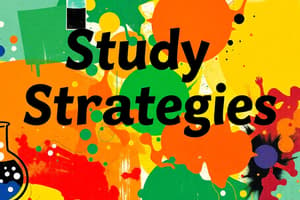Podcast
Questions and Answers
What is the primary purpose of SLGs?
What is the primary purpose of SLGs?
- To create a competition among students.
- To facilitate group study and enhance understanding of course material. (correct)
- To replace the need for attending lectures.
- To provide students with personal study sessions.
Which of the following is NOT a recommended study tip?
Which of the following is NOT a recommended study tip?
- Only study the night before the exam. (correct)
- Attend office hours to ask questions.
- Review lecture notes throughout the semester.
- Join a study group for discussion.
What is suggested to do with notes after a lecture?
What is suggested to do with notes after a lecture?
- Ignore them until the exams.
- Use them only for final exam preparation.
- Share them with classmates without looking over them.
- Review them as soon as possible. (correct)
What advantage do students have by attending office hours?
What advantage do students have by attending office hours?
Which activity is suggested for enhancing understanding of confusing concepts?
Which activity is suggested for enhancing understanding of confusing concepts?
What is an effective strategy for avoiding cramming before exams?
What is an effective strategy for avoiding cramming before exams?
What should students consider to take advantage of easy marks?
What should students consider to take advantage of easy marks?
Which of the following is emphasized for maintaining student wellness?
Which of the following is emphasized for maintaining student wellness?
Flashcards
SLG
SLG
Facilitated/guided study session held in a group setting.
Study Tips
Study Tips
Strategies to improve studying effectiveness.
Lecture Notes
Lecture Notes
Recordings of information taught during lectures.
Office Hours
Office Hours
Signup and view all the flashcards
Discussion Board
Discussion Board
Signup and view all the flashcards
Textbook Questions
Textbook Questions
Signup and view all the flashcards
Self-testing
Self-testing
Signup and view all the flashcards
Avoid Cramming
Avoid Cramming
Signup and view all the flashcards
Study Notes
SLGs (Supported Learning Groups)
- SLGs are facilitated/guided study sessions in a group setting
- They are drop-in, free, and voluntary
- They're a good way to cover course material and develop study strategies/habits
Today's Agenda
- Introductory Activity
- Activity 1
- Activity 2
- Activity 3
- Closing Activity
Student Wellness Services
- Counselling
- Student Health Services
- Health & Performance Centre (HPC)
- Student Support Network (SSN)
- Wellness Education & Promotion Centre
- Student Accessibility Services (SAS)
- Sexual and Gender Based Violence Support & Education
Study Tips
- Take notes during lectures, either on a laptop or by hand
- Review notes before each class to review the previous lecture
- Go over notes as soon as possible after class, highlighting areas of uncertainty
- Identify knowledge gaps at the end of each lecture
- Ask questions during office hours
- Utilize the discussion board and other SLG members
- Practice with textbook questions and create mock test questions
- Create mind maps to help understand complex concepts
- Paraphrase lecture notes for better understanding
- Review notes throughout the semester, compiling summary pages at the end of each week
- Take advantage of easy marks, like attendance in seminars
Disclaimer
- SLG leaders are not teaching assistants
- Leaders cannot provide answers or predict exam content
- Mistakes may not be caught if the review session is not attended
- The goal of the session is to work through multiple-choice questions as a group, and guide learners through the course content
Accessibility Statement
- Students requiring accommodations should contact their SLG leader or the SLG program ([email protected])
Memory (Additional Questions)
-
Definition of Memory: The persistence of learning over time through storage and retrieval of information and skills
-
Short-Term Memory Span: 7 +/- 2 chunks of information
-
Study Strategies: Re-reading, spaced studying, self-testing, and summarizing notes.
-
Types of Long-Term Memory: Explicit (facts and events) and Implicit (skills and procedures)
-
Long-Term Memory (LTM): Information held in LTM expands over time.
-
Retrieval failure: Forgetting occurs right before an exam due to the absence of a specific cue, context, etc.
Other Concepts (Additional Questions)
- Theory of Mind: Understanding that others have their own thoughts and perspectives.
- Classical Conditioning: Learning through associating two stimuli.
- Agonist: A molecule that fills a receptor site and activates it (like a neurotransmitter)
- Neurotransmitters: Chemical messengers in the brain affecting thoughts and behaviors, like those affected by alcohol's effect on the blood-brain barrier.
- Memory Issues: Forgetting, storage decay, encoding failure, retrieval failures (missing the cue needed to remember.)
- Defense Mechanisms: Strategies used to manage painful or difficult emotions and thoughts. (examples listed in other question responses.)
Studying That Suits You
Use AI to generate personalized quizzes and flashcards to suit your learning preferences.




